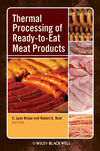Survey: Canadians Might Support Irradiation

The survey was conducted by Angus Reid Public Opinion for the Consumers Association of Canada. It found that while Canadians are concerned about food contamination, most do not know much about food irradiation.
The online survey of 1,006 Canadians found 57% of respondents had not heard of irradiation, which is a process that exposes foods to minute doses of radiation like X-rays to kill off bacteria.
Yet when the Canadians polled in the survey were given a brief explanation of the process, most said they would support having irradiated food at the grocery store as a choice.
As well, just over half of the respondents said they would be likely to consider buying irradiated food products for their household.
"What Canadians are telling us is they would like to have the choice of eluding any possible risk," Bruce Cran, the president of the Consumers Association of Canada, told reporters.
Forty countries currently zap some of their food with gamma rays or electron beams to kill dangerous bacteria such as E. coli and salmonella. The same process is used to sterilize numerous medical products.
According to Health Canada, the process does not diminish the nutritional value of the food, and no radioactive energy remains in the food after treatment.
In Canada, onions, potatoes, wheat, flour, whole wheat flour, and whole or ground spices and dehydrated seasonings are approved for irradiation. However, the technology has not been used widely in Canada; the main use has been on spices.
All irradiated foods sold in Canada must be labeled. In addition to a written description, such as "irradiated," a distinctive logo called the "radura" must be on the package.
In the U.S., beef, poultry, raw spinach and iceberg lettuce are approved for irradiating, but again, only a tiny of fraction of those foods in the U.S. is irradiated. The foods must also be labeled to indicate they have been irradiated.
While some retailers have tried to advertise irradiated hamburger as a safety selling point, overall sales of irradiated foods remain low.
Health Canada wanted to expand its food irradiation list to include other foods, such as mangoes, in 2002, but the idea didn't proceed due to a lack of demand and public distaste for the idea.
The Consumers Association of Canada wants meat products to be included on the list, saying it would reduce the number of meat-related foodborne illnesses.
Rick Holley, a professor of food safety and microbiology at the University of Manitoba, says irradiating meat would mean fewer Canadians would get sick every year from food poisoning.
"By irradiating just poultry, we could immediately, tomorrow, reduce foodborne illness by 25% in Canada," he told reporters.
Health Canada says it has completed the scientific review of applications for irradiation of ground beef, poultry, shrimp and prawns, and mangoes, but the proposed regulatory process has not been completed.
From the April 19, 2012, Prepared Foods’ Daily News
Looking for a reprint of this article?
From high-res PDFs to custom plaques, order your copy today!





